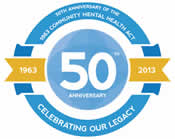(Dixon, IL) On October 31, 1963, President John F. Kennedy signed the Community Mental Health Act into law that provided federal funds to help support community mental health centers devoted to the treatment of mental illness. It was the last legislation President Kennedy signed into law.

“However, while there have been great advancement since 1963, the problems are not all solved and the battles are not all won,” adds Phelan. “We have a long way to go to realize the full potential of community-based care. We still have inadequate levels of resources, particularly financial support, to treat all who need it. Also, despite solid medical evidence that mental illness is a disease of the brain, like any other disease, those struggling with a mental illness are still subjected to the old stereotypes and ostracized because of the persistent stigma that still exists. This can cause individuals to avoid seeking the care they need.”
One way those stereotypes are perpetuated is the way the national news media in particular report on mass shootings in schools and other settings. They often rush to explain the cause of these acts as mental illness when the truth is far more complex and varied. The truth is quite the opposite in fact; individuals with mental health issues are generally the victims of crime, not the purveyors. The media’s theorizing about the psychiatric diagnoses of perpetrators demonizes mental illness and discourages others from seeking treatment at the very community mental health centers the 1963 law helped to create.
Patrick Kennedy, who is the son of the late Senator Ted Kennedy, has formed The Kennedy Forum to create a national conversation on mental health and addictions. Recently Kennedy said that, “The intent and energy behind the Community Mental Health Act diminished in the years following JFK’s untimely death. The money didn’t follow patients from institutions to the community, as he envisioned. While we’ve provided community and family-based treatment for many, we haven’t been able to make it a reality for all who need it.”
Three bills in front of Congress would help more fully realize President Kennedy’s dream of community behavioral healthcare:
- The Mental Health First Aid Act: Offers education and training to teachers, health workers, firefighters, police officers, emergency services personnel, and other community members.
- The Excellence in Mental Health Act: Creates Certified Community Behavioral Health Centers to better meet the needs of people currently being served, and those who will seek care as a result of coverage expansion and parity.
- The Behavioral Health IT Act: Provides financial incentives for the adoption and “meaningful use” of health information technology — the bedrock of improved care and coordination among practitioners— for mental health and addiction treatment providers and facilities.





